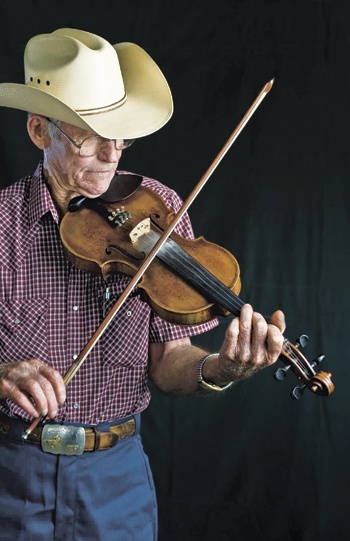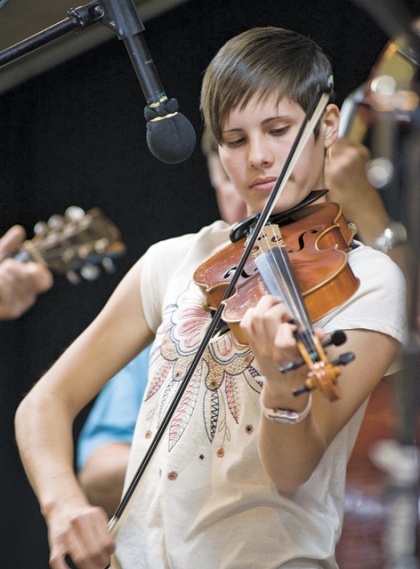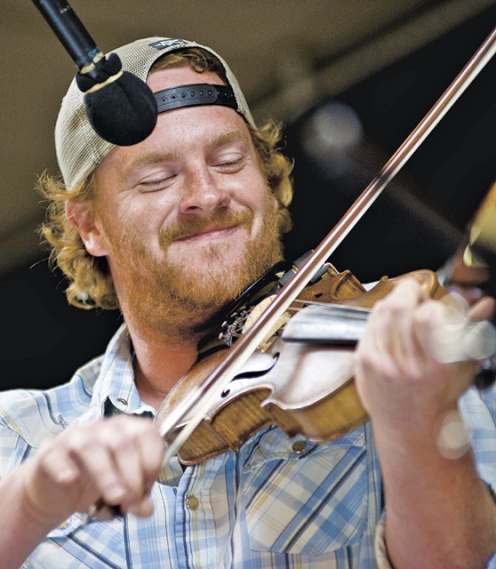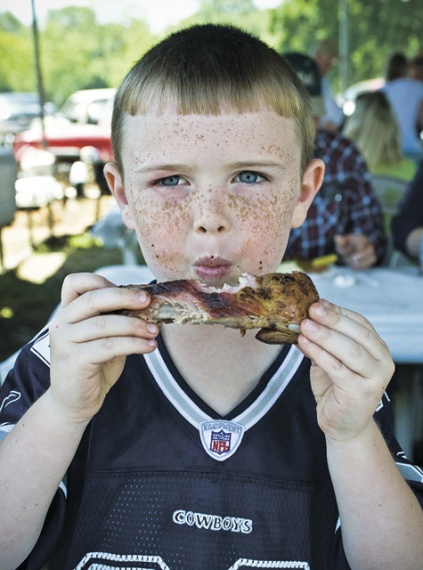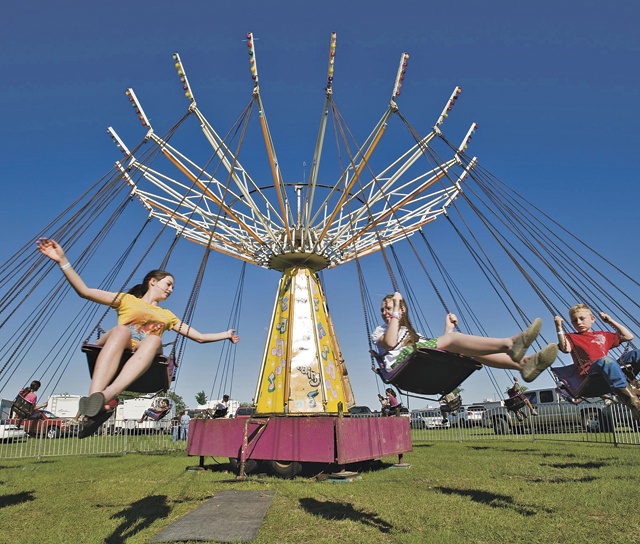Texans are fools for a fiddle. If you don’t believe it, take a stroll through the grounds of the annual Fiddlers’ Frolics in Hallettsville. There, amid curls of smoke from a simultaneous barbecue cook-off, the best contest fiddlers in Texas go mano a mano for the state championship.
Texas fiddlers can trace their roots prior to the Civil War, and fiddling contests are a Texas institution dating back to at least the 19th century. The tradition holds today, with numerous contests filling the calendar from March through September—and increasingly, women are joining men onstage. Two of the most popular competitions are the Texas Old Time Fiddlers Association World Championship Fiddlers Contest in Crockett (set for June 11) and the Athens Old Fiddlers Contest & Reunion (set for May 26-27).
But Hallettsville remains the undisputed big ’un, and only the National Oldtime Fiddlers’ Contest in Weiser, Idaho, and the Grand Master Fiddler Championship in Nashville come close to its national stature.
Slated for April 14-17 at the Knights of Columbus Hall in Hallettsville, the Texas State Championship Fiddlers’ Frolics is expected to draw some 15,000 fans from around the country. In addition to the state championship, other fiddling-related contests include: the Senior Division (ages 65 and older); the Forrest Craig Division (ages 15 and younger); the Gone To Texas showdown for out-of-state fiddlers; two guitar accompanist battles; and an Anything Goes spectacle for trick fiddlers.
Visitors can check out the Fiddlers’ Frolics Hall of Fame in the Knights of Columbus Hall and drop in on jam sessions all over the grounds. There are also dances and concerts featuring Cajun, zydeco and country bands, a midway, a crafts fair, seven barbecue cook-off categories, and the Texas Songwriters Serenade contest.
It’s all a far cry from the maiden Fiddlers’ Frolics of 1971, an afternoon affair held at Weid Hall, 10 miles west of Hallettsville. Kenneth Henneke remembers the day well, for he and Frank Zaruba were organizers; four decades later, they still are.
“We didn’t know what to expect then,” Henneke laughs. “We hoped for 300 people and got 1,200; the high point of the day was a seven-car wreck on the highway.” But local farmer Dan Jasek, a 79-year-old Moulton native who is the only fiddler to have competed every single year, remembers a different highlight. “It was so intriguing that first year to hear all the different types of fiddlers,” he says. “It still is today.”
That’s important. Though contest fiddlers do make CDs, this is primarily a folk form passed from ear to ear. Older fiddlers, generally speaking, have never taken a lesson or seen an instructional video in their lives; they learned their craft by listening to other fiddlers and copying them, adding their own touches as they improved. Several of the best young players come from families of contest fiddlers who go back several generations.
Texas fiddling continues a surge on the strength of newcomers like 17-year-old Mia Orosco of Lorena, who had eight years of classical violin training before discovering fiddling contests five years ago. She now plays both as often as she can. It’s not just her age that gives fiddling a shot in the arm, either. Orosco represents the growing number of females following in the wake of Valerie Ryals O’Brien, who’s seemingly won nearly every fiddling award there is and in 2009 became the first woman fiddler inducted into the Fiddlers’ Frolics Hall of Fame.
Five women finished in the top 20 of the Fiddlers’ Frolics state championship in 2010, including Orosco in fourth place—her first try after winning the 15-and-younger title the year before.
Despite such advances, contest fiddling remains a throwback, the last vehicle that traditionalists have for showing their stuff. Their repertoire consists of ancient tunes like “Sally Goodin,” “Sally Johnson” and “Tom and Jerry.” Unlike fiddlers who play with country bands, the aim of contest fiddlers is not to impress the audience by helping get couples out on the dance floor or by winning concert encores; it’s to impress judges with their knowledge and flair for the eternal verities, which can be so nuanced that to the untrained ear the music might all sound the same.
But Texas fiddlers—being Texans, after all—take it further, using the full length of the bow (as opposed to fiddlers elsewhere who use just part of it). They have developed a sophisticated style that features intricate, well-coordinated wrist and forearm motions and “fancy fingering.” The so-called longbow style, which probably first surfaced here in the 1920s, reached its highest fruition around 1960 via the music of Benny Thomasson, an Arlington auto-body-shop worker, and results in an unusually rich and busy sound filled with slurs, slides, overtones and octave shifts.
And Texas fiddlers are improvisers; though most traditional tunes have just two parts (variations on the melody), Texans, without ever straying too far from the original tune, have worked many of them over until they now have five or six. As traditional musicians from Appalachia and elsewhere have struggled to keep up, “Texas style” has become virtually synonymous with “contest fiddling.”
“This kind of fiddling is much harder than even Western swing,” declares defending Fiddlers’ Frolics’ state champion Wes Westmoreland III, 48, of Temple. He comes from a contest-fiddling family but has also backed commercial music stars like Mel Tillis and the late Boxcar Willie. “Playing this music is almost an aerobic experience—it’ll make you sweat,” says Westmoreland, a seven-time winner in Hallettsville who’s known for his expansive bow work.
Last year’s win—which netted Westmoreland $1,500, a Texas-size belt buckle, a fiddle stand and a plaque—was especially dramatic. In the first round of the championships, some 27 entries took turns playing a breakdown (a particular, repetitive kind of fiddle tune) and a “tune of choice” (any type except another breakdown).
The field was then narrowed down to 10 semifinalists and the process repeated, with Westmoreland, Dennis Ludiker and Bubba Hopkins announced as the finalists. The now-27-year-old Ludiker, who won the Frolics overall title in 2008 and ’09, hails from a Spokane, Washington, family of champion fiddlers, and moved to Austin in 2002. Hopkins, of Burleson, snared the Gone To Texas title in 2009 when he was 19 and finishing up college in his native Oklahoma. But this was his first try at the Texas state crown.
It was youth vs. experience as the three men squared off for a round-robin championship. And that’s where things got real interesting.
Each man had to play his choice of a hornpipe—probably the most complex type of fiddle tune—then each chose a breakdown; the pattern was repeated for a rag, a swing tune and a polka. If a competitor was really feeling his oats, he’d go with something his predecessor had played, the idea being to sway the judges by whupping a foe at his own specialty.
Hopkins, wearing a red checkered shirt and faded, frayed blue jeans, played a showy version of “Dusty Miller” for his breakdown, whooping as he bore down on his bow. Then Westmoreland, in a Hawaiian shirt and white cowboy hat, came back with a more rhythmic arrangement of the same, and even from the back of the room you could hear his foot tapping on the stage; the difference in styles was clear. He also answered Ludiker’s speedy “Lady Be Good” with his own, more delicate, version. But the contest wasn’t over yet.
In an unprecedented situation for the Fiddlers’ Frolics, Ludiker and Hopkins were tied and had to play one more tune. Were they competing for first and second? Second and third? They and the audience did not know. Ludiker led with a calmly confident version of “Honey Boy,” an original composition by Texas fiddle legend Louis Franklin. Hopkins whooped his way through a flashier rendition that was clearly the audience favorite. As it turned out, the judges agreed, awarding Hopkins second place and Ludiker third behind Westmoreland.
In the battle of youth vs. experience, experience won. For an old-time fiddling contest like the Frolics, that seemed only appropriate.
——————–
John Morthland is a freelance writer based in Austin who has worked for Rolling Stone, Creem and Country Music magazines and numerous other music publications.
